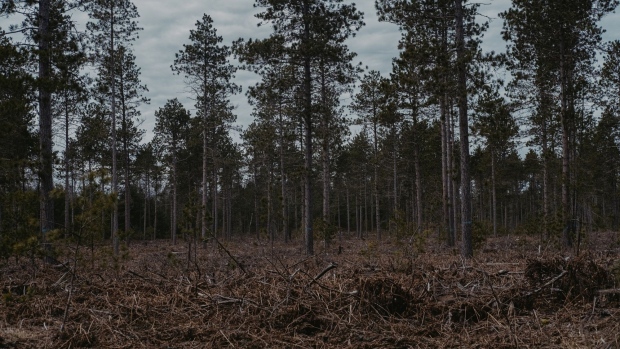Jul 7, 2022
World’s Biggest Carbon Credit Load Pits Firms Against Ministers
, Bloomberg News

(Bloomberg) -- Record issuance of carbon credits is fanning tensions that threaten to pit governments against corporations, as both lay claim to the same assets.
Gabon, the world’s second-most-forested country, plans to have issued 90 million carbon credits to the market by November, Environment Minister Lee White said last week. He also took the opportunity to cast doubt over an announcement by TotalEnergies SE that it’s setting up its own offsets project in Gabon.
“They don’t have the rights” to the carbon in question, he told Bloomberg.
The dispute exposes the state of limbo in which the carbon market currently finds itself, as details of rules governing who owns carbon, how it can be traded, and who can claim the corresponding emissions-savings hang in the balance. The lack of clarity means market participants risk getting dragged into potential legal battles that may play out across jurisdictions.
“Until now, the voluntary carbon market has operated in a policy vacuum,” said Sebastien Cross, co-founder of carbon ratings agency BeZero.
“The general assumption has been that carbon rights are part of property rights, and that credits can be issued accordingly,” he said. “But that’s changing,” since the COP26 climate summit last November. “All carbon is now effectively national.”
Carbon credits are tokens representing a ton of climate-warming carbon dioxide that’s reduced, removed or not added to the atmosphere. They are typically issued by a company or project and issuance by a country marks a new phase in the market’s development. Since the COP26 agreement, any sale of credits internationally may need to be accounted for in the country’s own carbon inventory within a trading framework that aims to prevent double counting.
The development means governments are now worried about private-sector exports of carbon, after having paid little attention to them over the past decade, said Hannah Hauman, global head of carbon trading at Trafigura.
“We are seeing policy and political risk intensifying greatly,” she said.
Governments are now reviewing laws to stop companies from exporting credits that might fit into national plans, and to ensure they get a fair share of the proceeds. In March, Papua New Guinea suspended new carbon credit deals and is now working on new rules. In April, Indonesia halted carbon-project verification and froze the export of carbon offset credits. Honduras and China’s Fujian province also recently announced moratoriums on the sale of forest-based carbon credits.
“Carbon is now effectively a sovereign asset,” said Chris Leeds, head of carbon markets development at Standard Chartered Plc. “Whether you like it or not, the reality is that governments will have some jurisdiction over carbon.”
But in many countries, legal ownership of carbon remains unclear, said Peter Werner, senior counsel at the International Swaps and Derivatives Association, an industry body.
“Trading without legal certainty as to what I’m trading is a problem,” said Werner. “You could end up in a situation where, several levels down the trading chain, you find out the credit isn’t legally valid, for example it has been ‘stolen’ or simply doesn’t exist in a legal sense.”
Gabon’s credits have been generated via the UNFCCC REDD+ process based on the country claiming to have reduced emissions from deforestation and forest degradation from 2010 to 2018, according to a prospectus.
The emissions reductions are being assessed by experts on a UNFCCC roster and will be sold via a new platform, redd.plus, a collaboration between S&P Global’s IHS Markit, CBL commodity exchange, and the Coalition for Rainforest Nations, which represents over 50 developing countries.
White said he won’t accept less than $15 per credit. Similar credits currently sell for between $8 and $10.
REDD+ is a voluntary framework created by the UNFCCC Conference of the Parties in 2013 to encourage governments to protect national forests. Historically, it has operated as a results-based payment mechanism, not as a carbon offsetting scheme, said Hauman. “It’s not yet clear how voluntary corporate buyers will perceive these credits.”
Gilles Dufrasne, policy officer at the nonprofit, Carbon Market Watch, said REDD+ isn’t suited to this purpose. “The REDD+ mechanism doesn’t create credits for carbon markets,” he said. “The assessment process isn’t robust enough, and there are missing requirements to guarantee that credits represent real, high-quality reductions.”
While there is a verification process for emissions reductions, the results can’t be rejected by UNFCCC experts, a spokesperson for the group said. The onus is on the buyer to use the available documentation to assess whether they are worth paying for.
Despite the uncertainty, developing countries are keen to raise money that can help them adapt to climate change, to meet their own emissions targets and be compensated for good practice.
“A lot of countries feel that the voluntary carbon market is trading in stolen carbon,” said Kevin Conrad, chief executive at redd.plus and executive director of the Coalition for Rainforest Nations. Carbon trading by companies under varying voluntary standards is seen as “a big threat” to the implementation of the Paris Agreement, he said.
Gabon’s issuance of sovereign offset credits via redd.plus is just one plan. By November Papua New Guinea intends to approve 16 million credits and Belize nine million, Conrad said.
©2022 Bloomberg L.P.








